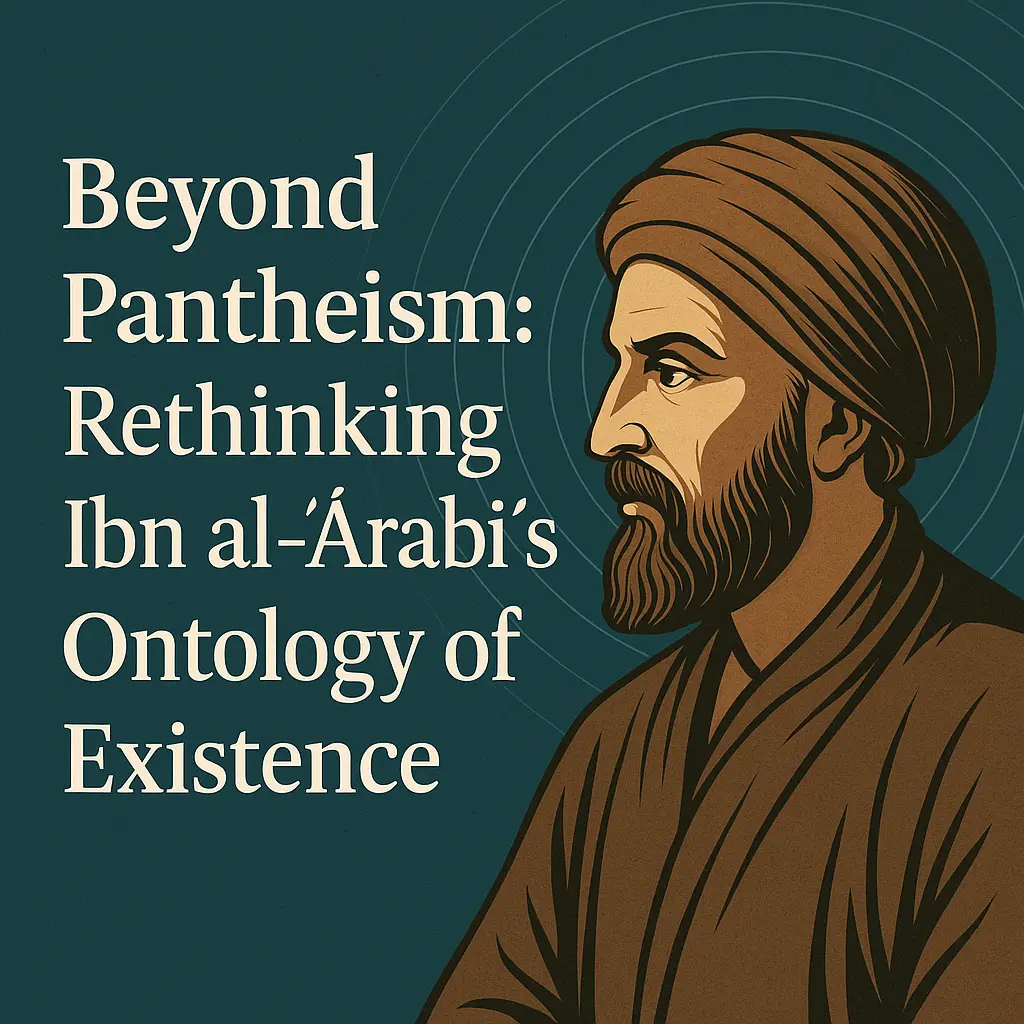Introduction
Few figures in world philosophy have generated as much awe — and as much misunderstanding — as Muḥyī al-Dīn Ibn al-ʿArabī (1165–1240), the “Greatest Master” (al-Shaykh al-Akbar). His vast metaphysical system, later summarized under the label waḥdat al-wujūd (“unity of being”), has inspired centuries of Sufi thought. Yet in both Western philosophy and modern spiritualist circles, his metaphysics is often flattened into pantheism — the claim that “all is God” in a simple identity.
This is a misrepresentation. Ibn al-ʿArabī’s vision is neither pantheism nor vague mysticism. It is a rigorously Qur’ānic ontology of existence, where only God truly is, and creation is the unfolding of His names. Even more, it is an anthropology — a profound account of the human being as the conscious mirror of divine disclosure. In this sense, Akbarian metaphysics is not a romantic mysticism, but perhaps the most complete philosophical anthropology of man ever formulated.
Why Akbarian Metaphysics is Misread as Pantheism
The pantheistic misreading has multiple roots:
-
Terminological Ambiguity: The phrase waḥdat al-wujūd suggests a crude equation between God and creation.
-
Western Comparisons: Scholars influenced by Spinoza read Ibn al-ʿArabī as a monist who collapses Creator and creation.
-
Modern Spiritualism: New Age and perennialist thinkers often extract Ibn al-ʿArabī’s language of “unity” to support a vague universalist mysticism, detached from Qur’ānic categories.
-
Theological Polemics: Critics like Ibn Taymiyyah accused Ibn al-ʿArabī of erasing the Creator–creation distinction, cementing the suspicion of pantheism.
But Ibn al-ʿArabī’s texts resist such simplification. He constantly balances tanzīh (divine transcendence) with tashbīh (divine immanence), affirming that while God is present in all things, He infinitely exceeds them.
The Ontology of Existence
For Ibn al-ʿArabī:
God is al-Wujūd al-Ḥaqq — the Real Existence.
Created things (mawjūdāt) do not possess existence inherently; they are possibilities (mumkināt) clothed in borrowed being.
The cosmos is not identical with God, but has no reality apart from Him.
This is not pantheism. It is a metaphysics of dependence: creation is an ever-renewed act of divine self-disclosure (tajallī). Existence is singular, but its manifestations are multiple.
Against Modern Pantheistic Appropriations
Modern spiritualist and New Age movements often embrace Ibn al-ʿArabī through a selective reading:
Unity as Homogenization: They interpret waḥdat al-wujūd as “everything is equally divine,” erasing the careful Qur’ānic hierarchy of Creator and creation.
Anthropology Ignored: They bypass Ibn al-ʿArabī’s emphasis on man as khalīfa (vicegerent) and insān kāmil (perfected human), flattening human uniqueness into generic cosmic oneness.
Metaphysics Without Qur’ān: They abstract his language of “unity” from its Qur’ānic grounding in verses like “God is the Light of the heavens and the earth” (24:35), stripping it of its theological precision.
In short, these modern readings transform Ibn al-ʿArabī’s subtle metaphysics into romantic pantheism or perennialist universalism, diluting its rigor and its profound anthropology.
Akbarian Anthropology: Man as Mirror of Being
Where Ibn al-ʿArabī is most original is not in asserting divine unity — a common theme in mysticism — but in elaborating a unique anthropology:
Man is the barzakh (isthmus) between the divine and the created, bridging transcendence and immanence.
Man uniquely gathers all the divine names within himself; the rest of creation reflects only fragments.
Man is the site of divine self-knowing — the mirror through which God contemplates His own names.
The perfected human (al-insān al-kāmil) is the fullest realization of this vocation: a conscious participant in divine disclosure.
This is not pantheism. It is a vision of man as the central anthropological key to reality: the being through whom Being itself becomes intelligible.
Why This Is the Best Anthropological Theory of Man
Akbarian anthropology surpasses both reductive naturalism and modern pantheism:
-
Holistic Integration: Man unites body, soul, and spirit — material, psychological, and divine dimensions.
-
Ontological Centrality: Man is not accidental but ontologically privileged, the mirror of the cosmos.
-
Epistemic Role: Human consciousness is essential to God’s self-disclosure — a radical claim about the dignity of knowledge.
-
Ethical and Spiritual Task: Man’s vocation is to polish the mirror of the self so that divine light shines unobstructed — an existential anthropology rooted in praxis.
No other anthropology — whether Aristotelian rationalism, Cartesian dualism, or modern existentialism — integrates metaphysics, psychology, and spirituality so comprehensively.
Conclusion
To label Ibn al-ʿArabī a pantheist is to profoundly misrepresent him. His vision is not a flattening of God and creation into one, but a rigorous ontology of existence and an unparalleled anthropology of man.
Modern pantheistic or New Age appropriations miss this by reducing unity to homogeneity and ignoring the central role of man as barzakh and insān kāmil. For Ibn al-ʿArabī, man is the mirror of divine names, the site of ontological disclosure, the axis of existence itself.
Thus, Akbarian metaphysics remains, not a mystical curiosity, but arguably the most complete philosophical anthropology ever articulated — one that affirms the transcendence of God, the dependence of creation, and the unique dignity of man as the conscious reflection of Being.
